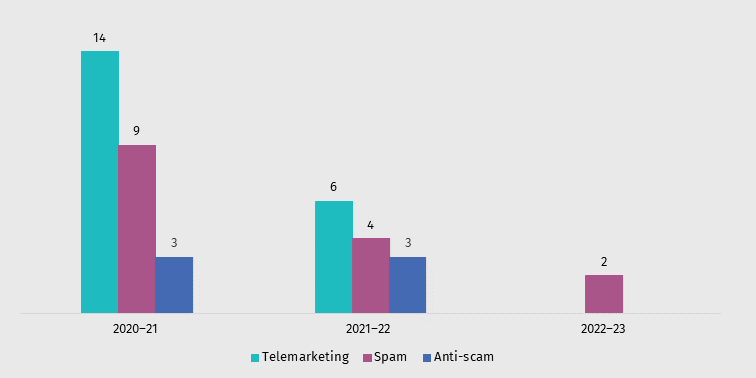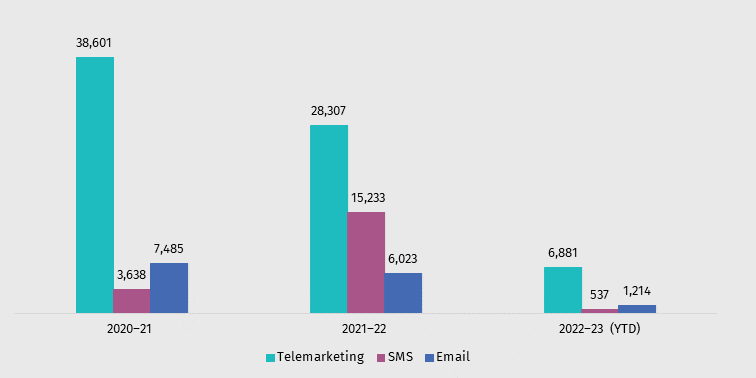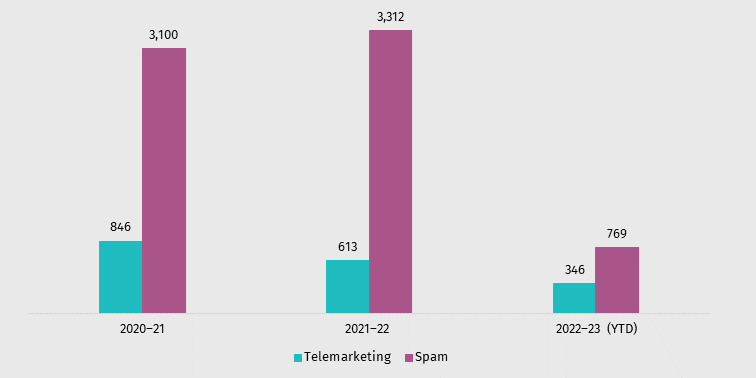|
Our key actions |
|
|---|---|
|
|
Latitude Finance Australia penalised $1.55 million for breaches of the Spam Act. |
 |
Businesses have paid over $5 million in penalties for breaching spam and telemarketing rules in the last 18 months. |
|
|
We registered new rules to protect consumers from scam SMS, with nearly 48 million SMS blocked in the first 3 months. |
|
|
Over 800 million scam calls blocked since rules commenced in December 2020. |
 |
Telco Circles.Life penalised $200,000 – and it offered over $100,000 compensation to consumers – after failing to have ID checks in place to prevent scammers accessing mobile accounts. |
Our 2022–23 priorities
We have 2 compliance priorities for the 2022–23 financial year for unsolicited communications:
- Combating SMS and identity theft phone scams – enforcing new rules on telcos to use stronger ID checks, and establishing new rules to reduce SMS scams.
- Enforcing SMS and email unsubscribe rules – focusing on businesses that take no notice of customer unsubscribe requests, or make it hard for them to unsubscribe.
Combating phone scams
We are taking the fight to scammers to disrupt their activities and protect Australians. During the quarter, we:
- Reported that over 800 million scam calls have been blocked by telcos under the Reducing Scam Calls rules from 2 December 2020 to 30 September 2022. We provided de-identified complaint data to telcos to help them identify these calls.
- Reported that nearly 48 million scam SMS have been blocked since new rules requiring telcos to identify, trace and block scam SMS commenced on 12 July 2022.
- Took action against Circles Pty Ltd for failure to comply with the Mobile Number Pre-Porting Identity Verification Standard. This resulted in Circles.Life paying an infringement notice of $199,800 and over $100,000 in compensation after multiple consumers were scammed.
- Issued consumer alerts about fake job offers, technical support and lost phone/new number scams.
- We agreed to collaborate with the Info-communications Media Development Authority of Singapore (IMDA) to combat unsolicited communications. This is the latest in a series of cross-border initiatives we’ve taken with other regulators to tackle the global problem.
- Continued to work behind the scenes with telcos, government agencies and well-known brands to disrupt phone scams.
Find out more about how to protect yourself from phone scams.
Compliance with unsubscribe rules
Key actions and outcomes in our focus on unsubscribe rules included:
- A $1,549,560 penalty paid by Latitude Finance Australia after it mischaracterised commercial emails and texts as ‘information only’ messages. These messages, sent to existing card holders, promoted Latitude products including credit cards – such as 28° Global, Go Mastercard, Gem Visa and CreditLine – mobile applications and reward programs. Latitude sent over 3 million commercial emails and text messages without an unsubscribe function between June 2021 and March 2022. These messages continued to be sent to customers who had attempted to unsubscribe. We also accepted a 3-year court enforceable undertaking from the company, under which it will have an independent audit and implement improvements.
- 367 compliance alerts and targeted fact sheets given to businesses identified from complaints to the ACMA as having potential issues with unsubscribe requirements.
Read more about our compliance priorities.
Key compliance issue: When a service message might also be commercial
We are receiving complaints that indicate some businesses may not understand what a ‘commercial electronic message’ is under the Spam Act. This may occur where messages are mostly ‘factual’ – like a bill, invoice or other account or service-related message – and also include some form of promotional or sales content.
Under the spam rules, promotional or sales content for goods or services within a message make it commercial, regardless of whether it contains other factual content. The messages may also be commercial if promotional or sales material can be located using the links, telephone numbers or contact information in the message.
Examples of messages likely to be commercial include:
- A bill or invoice sent to a customer that has a banner advertisement for products or services, or that directly links to an ad for products or services.
- A follow-up email to promote additional products and services related to an existing customer relationship.
- Messages sent to comply with other laws – such as product disclosures or account confirmations – if they also have additional promotional material.
Logos or branding in an otherwise factual message would not generally be commercial.
The simplest way to comply is to keep service or factual messages and promotional content distinct and in separate communications.
For commercial messages to be sent, businesses must have consent. The messages must also include accurate information about the sender and a functional unsubscribe.
Businesses are encouraged to familiarise themselves with these rules and ensure their service or factual messages are compliant.
Learn more about the consent and unsubscribe laws.
Investigations and enforcement
We finalised 2 investigations and commenced 2 investigations in the quarter. We had 4 underway at the end of the quarter.
Investigations took 3.4 months on average to complete.
We monitored compliance with 18 court-enforceable undertakings currently in force. These set out the actions businesses must take to comply with spam, scam and telemarketing laws.
View our enforcement actions for breaches of spam and telemarketing laws.
View our enforcement actions for breaches of scam laws.
Find out more about our compliance and enforcement role and the penalties for breaking the rules.
Finalised investigations

Complaints
Consumer complaints directly inform our actions and help us identify issues and trends. We also provide de-identified complaint data to telcos to help them identify and block scam calls.
- 21% of all telemarketing and spam complaints were about scams.
- The most common complaints were about retail, financial services and the building/ maintenance sectors.

Please note: We have also received 24 complaints about commercial instant messages so far in 2022–23.
Compliance alerts
We alert businesses about potential compliance issues raised in complaints where we can. We provide details to the business when the complainant has given us permission. If the issues continue, we may investigate. One alert can relate to several issues or complaints.

Please note: This report was updated on 16 February 2023 to correct some data discrepancies.
More information
Find out more about spam and telemarketing rules and what actions you can take, including making a complaint.
Subscribe to our newsletters to get updates about our actions on telemarketing, spam and scams.
Access the data
Download the data for the charts in this report.



